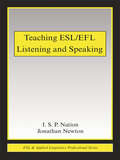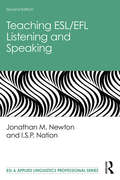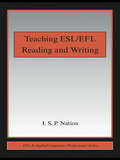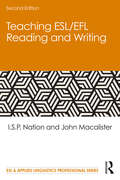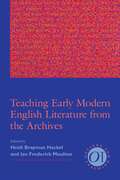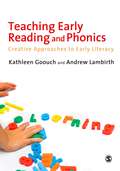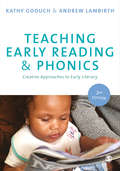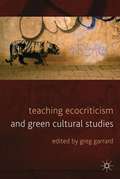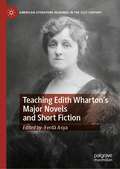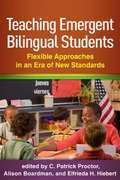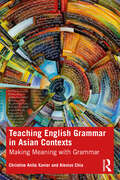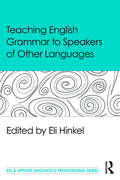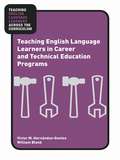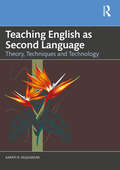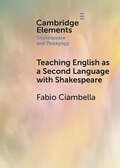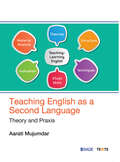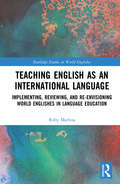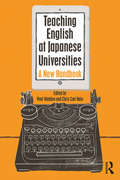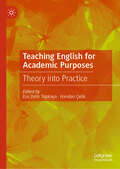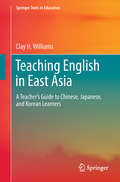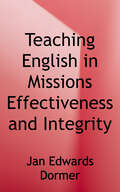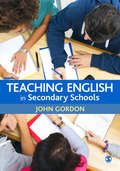- Table View
- List View
Teaching ESL/EFL Listening and Speaking (ESL & Applied Linguistics Professional Series)
by I.S.P. Nation Jonathan NewtonUsing a framework based on principles of teaching and learning, this guide for teachers and teacher trainees provides a wealth of suggestions for helping learners at all levels of proficiency develop their listening and speaking skills and fluency. By following these suggestions, which are organized around four strands - meaning-focused input, meaning-focused output, language-focused learning, and fluency development - teachers will be able to design and present a balanced program for their students. Teaching ESL/EFL Listening and Speaking, and its companion text, Teaching ESL/EFL Reading and Writing, are similar in format and the kinds of topics covered, but do not need to be used together. Drawing on research and theory in applied linguistics, their focus is strongly hands-on, featuring easily applied principles, a large number of useful teaching techniques, and guidelines for testing and monitoring. All Certificate, Diploma, Masters and Doctoral courses for teachers of English as a second or foreign language include a teaching methods component. The texts are designed for and have been field tested in such programs.
Teaching ESL/EFL Listening and Speaking (ESL & Applied Linguistics Professional Series)
by Jonathan M. Newton I.S.P. NationThis guide for teachers and teacher trainees provides a wealth of suggestions for helping learners at all levels of proficiency develop their listening and speaking skills and fluency, using a framework based on principles of teaching and learning. By following these suggestions, which are organized around four strands – meaning-focused input, meaning-focused output, language-focused learning, and fluency development – teachers will be able to design and present a balanced program for their students. Updated with cutting-edge research and theory, the Second Edition of Teaching ESL/EFL Listening and Speaking retains its hands-on focus and engaging format, and features new activities and information on emerging topics, including: Two new chapters on Extensive Listening and Teaching Using a Course Book Expanded coverage of key topics, including assessment, pronunciation, and using the internet to develop listening and speaking skills Easy-to-implement tasks and suggestions for further reading in every chapter More tools for preservice teachers and teacher trainers, such as a sample unit, a "survival syllabus," and topic prompts The second edition of this bestselling book is an essential text for all Certificate, Diploma, Masters and Doctoral courses for teachers of English as a second or foreign language.
Teaching ESL/EFL Reading and Writing (ESL & Applied Linguistics Professional Series)
by I.S.P. NationUsing a framework based on principles of teaching and learning, this guide for teachers and teacher trainees provides a wealth of suggestions for helping learners at all levels of proficiency develop their reading and writing skills and fluency. By following these suggestions, which are organized around four strands – meaning-focused input, meaning-focused output, language-focused learning, and fluency development – teachers will be able to design and present a balanced program for their students. Teaching ESL/EFL Reading and Writing, and its companion text, Teaching ESL/EFL Listening and Speaking, are similar in format and the kinds of topics covered, but do not need to be used together. Drawing on research and theory in applied linguistics, their focus is strongly hands-on, featuring easily applied principles, a large number of useful teaching techniques, and guidelines for testing and monitoring, All Certificate, Diploma, Masters and Doctoral courses for teachers of English as a second or foreign language include a teaching methods component. The texts are designed for and have been field tested in such programs.
Teaching ESL/EFL Reading and Writing (ESL & Applied Linguistics Professional Series)
by John Macalister I.S.P. NationThe second edition of this bestselling text, Teaching ESL/EFL Reading and Writing, is a fully updated and expanded guide for teaching learners at all levels of proficiency how to develop their reading and writing skills and fluency. Practical and accessible, this book covers a diverse array of language teaching techniques suitable for all contexts. Updated with cutting-edge research and theory, the second edition is an essential and engaging text. Key insights and suggestions are organised around four strands – meaning-focused input, meaning-focused output, language-focused learning, and fluency development – to allow teachers to design and present a balanced programme for their students. Bringing together research and theory in applied linguistics and education, the text includes useful examples and practical strategies and features new topics related to technology, assessment, and genre. The second edition includes new tasks and further reading sections in every chapter. Teaching ESL/EFL Reading and Writing is designed for practising and pre-service teachers of all levels, and is ideal for certificate, diploma, masters, and doctoral courses in English as a second or foreign language.
Teaching Early Modern English Literature from the Archives (Options for Teaching #36)
by Heidi Brayman Hackel and Ian Frederick MoultonThe availability of digital editions of early modern works brings a wealth of exciting archival and primary source materials into the classroom. But electronic archives can be overwhelming and hard to use, for teachers and students alike, and digitization can distort or omit information about texts. Teaching Early Modern English Literature from the Archives places traditional and electronic archives in conversation, outlines practical methods for incorporating them into the undergraduate and graduate curriculum, and addresses the theoretical issues involved in studying them. The volume discusses a range of physical and virtual archives from 1473 to 1700 that are useful in the teaching of early modern literature--both major sources and rich collections that are less known (including affordable or free options for those with limited institutional resources).Although the volume focuses on English literature and culture, essays discuss a wide range of comparative approaches involving Latin, French, Spanish, German, and early American texts and explain how to incorporate visual materials, ballads, domestic treatises, atlases, music, and historical documents into the teaching of literature.
Teaching Early Reading and Phonics
by Kathy Goouch Andrew LambirthTeaching Early Reading and Phonics: Creative Approaches to Early Literacy supports teachers using phonics in their teaching of early reading. The authors show how important it is to ensure that children acquire a wide range of reading strategies, while also setting out practical ’pointers’ which will enable teachers to translate the theory into effective practice. Readers will learn how to plan phonics within a rich, interactive and playful literacy pedagogy; how to construct relationships with the young readers in their classes and the texts around them; how to embed the teaching of phonics in carefully selected high quality materials – particularly in children’s literature. Written for practicing teachers, student teachers on initial teacher training courses at undergraduate and graduate levels, the book will also be useful for advisors working on continuing professional development.
Teaching Early Reading and Phonics: Creative Approaches to Early Literacy
by Kathy Goouch Andrew LambirthLearning to read is an exciting and vital part of every child’s development. The new edition of this book continues to provide trainees and teachers with a broad understanding of teaching reading and phonics, and equip them with the skills necessary to face the reality of the early years classroom in order to meet the needs of individual children. With vital information on constructing relationships with young readers, and how to plan phonics within a rich, interactive and playful literacy pedagogy, the second edition now includes: A brand new chapter on babies and early reading More information on language acquisition and how children learn A discussion of children with SEN An appreciation for the rise of digital technologies in relation to reading Whether you're training to become a teacher, or already working in the classroom this book is ideal for those who wish to embed the teaching of phonics into carefully selected high quality materials - particularly in children's literature.
Teaching Early Reading and Phonics: Creative Approaches to Early Literacy
by Kathy Goouch Andrew LambirthLearning to read is an exciting and vital part of every child’s development. The new edition of this book continues to provide trainees and teachers with a broad understanding of teaching reading and phonics, and equip them with the skills necessary to face the reality of the early years classroom in order to meet the needs of individual children. With vital information on constructing relationships with young readers, and how to plan phonics within a rich, interactive and playful literacy pedagogy, the second edition now includes: A brand new chapter on babies and early reading More information on language acquisition and how children learn A discussion of children with SEN An appreciation for the rise of digital technologies in relation to reading Whether you′re training to become a teacher, or already working in the classroom this book is ideal for those who wish to embed the teaching of phonics into carefully selected high quality materials - particularly in children′s literature.
Teaching Ecocriticism and Green Cultural Studies
by Greg GarrardEcocriticism is one of the most vibrant fields of cultural study today, and environmental issues are controversial and topical. This volume captures the excitement of green reading, reflects on its relationship to the modern academy, and provides practical guidance for dealing with global scale, interdisciplinarity, apathy and scepticism.
Teaching Edith Wharton’s Major Novels and Short Fiction (American Literature Readings in the 21st Century)
by Ferdâ AsyaThis book translates recent scholarship into pedagogy for teaching Edith Wharton’s widely celebrated and less-known fiction to students in the twenty-first century. It comprises such themes as American and European cultures, material culture, identity, sexuality, class, gender, law, history, journalism, anarchism, war, addiction, disability, ecology, technology, and social media in historical, cultural, transcultural, international, and regional contexts. It includes Wharton’s works compared to those of other authors, taught online, read in foreign universities, and studied in film adaptations.
Teaching Emergent Bilingual Students: Flexible Approaches in an Era of New Standards
by Elfrieda H. Hiebert Alison Boardman C. Patrick ProctorRecent educational reform initiatives such as the Common Core State Standards (CCSS) largely fail to address the needs--or tap into the unique resources--of students who are developing literacy skills in both English and a home language. This book discusses ways to meet the challenges that current standards pose for teaching emergent bilingual students in grades K-8. Leading experts describe effective, standards-aligned instructional approaches and programs expressly developed to promote bilingual learners' academic vocabulary, comprehension, speaking, writing, and content learning. Innovative policy recommendations and professional development approaches are also presented.
Teaching English Grammar in Asian Contexts: Making Meaning with Grammar
by Christine Xavier Alexius ChiaThis book guides teachers, teacher educators and pre-service student teachers on using grammar as a pedagogical tool for meaning making, linking grammar as a meaning-making resource to literacy development. When grammar is meaningfully linked to literacy skills such as reading and writing, there is contextualised teaching of grammar.The authors thoroughly explore key concepts in grammar, including grammar as structure and grammar as choice. They illuminate these concepts by analysing a range of authentic texts from Asian contexts, showing how specific grammar features are purposefully used to convey meaning. Examples and illustrations of teaching ideas and materials focusing on contextualised teaching of grammar, including lesson plans, activity outlines, worksheets and teaching strategies, are contributed by current teacher practitioners who have tried out these ideas in their language classes. These teacher practitioners also share their reflections on how these ideas have worked in their classes.As a result, this book is an indispensable resource for teachers, teacher educators, pre-service teachers of English as both a first language and a second or foreign language, as well as anyone who is interested in harnessing the power of grammar to enhance English language teaching and literacy development.
Teaching English Grammar to Speakers of Other Languages (ESL & Applied Linguistics Professional Series)
by Eli HinkelThis practical and research-based introduction to current and effective English grammar instruction gives pre-service and in-service teachers and teacher educators a strong foundation for teaching second language grammar and helps them develop their professional knowledge and skills. Written in a highly readable style for an international audience, it provides a thorough and rounded overview of the principles, strategies, techniques, and applications currently dominant in teaching L2 grammar in a range of instructional settings around the world. Chapter authors are world-class authorities in grammar and grammar teaching and learning. All chapters are based on theoretical frameworks and/or research foundations with a strong emphasis on practical applications and implications for classroom teaching, and highlight teaching methods, key concepts, and terminology associated with grammar instruction. Illuminating the options and choices in grammar teaching from a contemporary perspective, Teaching English Grammar to Speakers of Other Languages is ideal as key text for students in undergraduate and graduate MA-TESOL programs and as a resource for practicing ESL/EFL teachers, teacher educators, and teaching faculty.
Teaching English Language Learners in Career and Technical Education Programs
by Victor M. Hernández-Gantes William BlankExploring the unique challenges of vocational education, this book provides simple and straightforward advice on how to teach English Language Learners in today's Career and Technical Education programs. The authors' teaching framework and case studies draw from common settings in which career and technical educators find themselves working with ELLs—in the classroom, in the laboratory or workshop, and in work-based learning settings. By integrating CTE and academic instruction, and embedding career development activities across the curriculum, readers will gain a better understanding of the challenges of teaching occupationally-oriented content to a diverse group of learners in multiples settings.
Teaching English Language Learners through Technology
by Tony Erben Ruth Ban Martha CastañedaIn Teaching English Language Learners through Technology, the authors explore the use of computers/technology as a pedagogical tool to aid in the appropriate instruction of ELLs across all content areas. The special focus of this book is on the informed use of various technologies and software programs that can specifically aid ELLs. Strategies are also provided for varying levels of access--whether teachers teach in a one computer classroom, have access to multiple computers, or have the ability to go into a computer lab at their school. A fully annotated list of web and print resources completes the volume, making this a valuable reference to help teachers harness the power of computer-assisted technologies in meeting the challenges of including all learners in effective instruction.
Teaching English as Second Language: Theory, Techniques and Technology
by Aarati R MujumdarThis multidisciplinary volume is a systematic, well-researched resource to help understand the methods and techniques of teaching English as a second language. It integrates theory with praxis, drawing on the Cognitivist–Social interactionist theory and Constructivist approaches adopted in an English classroom. It provides insights into recent trends in teaching, given the changed teaching–learning scenario in education, while simultaneously aiding in the development of the 4IR skills much needed in the 21st century.Written in an easy-to-understand language, the book expounds on various language skills and their application in real-world classrooms. These classroom-tested techniques can be used by teachers by modifying the context in which they are used. The tasks help develop critical-thinking and problem-solving abilities in learners. The techniques and practices elucidated in the book are designed to be accessible to a global readership.This book will be useful to students, pre-service teachers, and researchers, who are new to the teaching of English Language. It will also be an essential companion to practicing in-service teachers and Teacher Trainers to further sharpen their concepts and skills.
Teaching English as a Second Language with Shakespeare (Elements in Shakespeare and Pedagogy)
by Fabio CiambellaTeaching pragmatics, that is, language in use, is one of the most difficult and consequently neglected tasks in many English as a Second Language classrooms. This Element aims to address a gap in the scholarly debate about Shakespeare and pedagogy, combining pragmatic considerations about how to approach Shakespeare's language today in ESL classes, and practical applications in the shape of ready-made lesson plans for both university and secondary school students. Its originality consists in both its structure and the methodology adopted. Three main sections cover different aspects of pragmatics: performative speech acts, discourse markers, and (im)politeness strategies. Each section is introduced by an overview of the topic and state of the art, then details are provided about how to approach Shakespeare's plays through a given pragmatic method. Finally, an example of an interactive, ready-made lesson plan is provided.
Teaching English as a Second Language: Theory and Praxis
by Aarati MujumdarA systematic and well-researched textbook with a multidisciplinary approach to understand the methods and techniques of teaching English as a second language. This book provides an easy-to-understand and easy-to-apply discussion on language structure, pronunciation, intonation, grammar, and vocabulary through numerous tasks and exercises. The section on "instructional practices" deals with various language skills and their applications in real-world classrooms. With actual classroom-tested techniques, Teaching English as a Second Language: Theory and Praxis would be an ideal companion for BEd students who are in the process of becoming teachers. It would also help practicing teachers who can modify and adapt these techniques and tasks to aid students develop language skills required to face the challenges of the twenty-first century. Key Features • Provides a comprehensive introduction to second language teaching with reference to the recent trends and developments in the area • Enables teachers to adopt a problem-solving approach to teaching English • Uses communicative language teaching (CLT) and task-based teaching methodology, helping learners to develop communication of meaning along with accuracy of form • Dedicated sections on classroom evaluation techniques and use of audiovisual aids and other resources for language teaching
Teaching English as an International Language: Implementing, Reviewing, and Re-Envisioning World Englishes in Language Education (Routledge Studies in World Englishes)
by Roby MarlinaHow do teachers inspire students to learn to appreciate different Englishes? Has anyone tried to teach world Englishes? If so, what do they do and how do they feel about it? Most importantly, do students see the benefits in learning about world Englishes? This book responds to these questions by 1) offering a clear and solid foundation for the development of English as an International Language (EIL)-oriented curricula in an English Language program and a teacher education program, 2) critically reviewing the current pedagogical principles and practices of teaching EIL, and 3) offering an alternative way of conceptualising and teaching EIL. Using a three-year undergraduate program of EIL in an Australian university as a research site, this book provides a detailed account of actual classroom practices that raise students’ awareness of world Englishes and engage them in learning how to communicate interculturally. This book is the first of its kind that explores the teaching of EIL in a country where English is a predominant and national language.
Teaching English at Japanese Universities: A New Handbook
by Paul Wadden Chris Carl HaleWritten by leading English-language educators in Japan, this Handbook provides an in-depth guide for the new generation of teachers at Japanese universities. In clear, accessible prose, it offers practical and detailed advice on effective classroom pedagogy, student motivation, learning styles, classroom culture, national language policy, career opportunities, departmental politics, administrative mindset, and institutional identity. Its four sections—The setting, The courses, The classroom, and The workplace—examine issues faced by university language teachers as well as challenges confronted by the increasing number of scholars teaching English as a Medium of Instruction (EMI) and Content and Language Integrated Learning (CLIL) courses. Firmly grounded in contemporary teaching method and theory, the Handbook’s 23 chapters also acknowledge the influence of diverse movements such as World Englishes, global issues, gender, and positive psychology. Its three appendices contain information on organizations, books, journals, and websites particularly useful for Japanese university educators; explanation of types and rankings of schools; ways to learn more about individual institutions for job-hunting; and detailed information on the structure (and Japanese titles) of faculty and non-teaching staff at the typical university. This Handbook is an invaluable resource for anyone teaching, or aspiring to teach, at a Japanese university.
Teaching English for Academic Purposes: Studies From An English-medium University (English Language Education #14)
by Clay Williams Rachael RueggThis book focuses on appropriate English for Academic Purposes instructional concepts and methods in the Japanese context. It investigates a variety of pedagogical techniques, addressing the fundamental academic English skills – listening, speaking, reading and writing – as well as assessment and materials development. All the research included was conducted in Japanese university settings, thus shedding new light on the effective implementation of EAP teaching and learning activities with Japanese learners of English. This book is of interest to anyone working in an EAP context at the secondary or tertiary level, especially those which include Japanese learners.
Teaching English for Academic Purposes: Theory into Practice
by Ece Zehir Topkaya Handan ÇelikThis book offers a helpful resource for English for Academic Purposes (EAP) practitioners, combining theoretical content with in-depth insights rooted in practice. EAP has a key role in preparing students for academic challenges in English-medium universities globally. With the increasing need for proficiency in academic English, there is a demand for a comprehensive resource that caters to instructors who are actively involved in or considering a career in the teaching of EAP. This book addresses this need through five clear thematic sections: the development of EAP practice and pedagogy, creating effective EAP courses, exploring linguistic issues, language skills, and EAP instruction, issues in assessment of learning and practice in EAP, and current perspectives in EAP. The volume features contributions from experts with extensive EAP teaching experience, research backgrounds, and scholarly publications. By drawing on their theoretical understanding and practical insights, the book will equip ELT professionals with essential knowledge, strategies, and practical approaches to tailor their instruction to the unique needs of EAP learners. It will also be of interest to teacher educators, students, and academics researching language teaching in English for Academic Purposes, English for Specific Purposes and English-Medium Instruction contexts.
Teaching English in East Asia
by Clay H. WilliamsThis book investigates the current EFL market in East Asia, focusing on K-12, university, and cram school English education in Japan, China, and Korea. It explores prevailing educational practices by both Asian learners and teachers of English, contrasting them with Western practices, and illuminating why Western pedagogical methods have often encountered tremendous resistance from teachers, administrators, parents, and students in the East Asian classroom context. After establishing this cultural contrast of pedagogical norms, the book presents a series of practical means for adapting Western teaching practices and philosophies to better suit the learning styles of East Asian students and the cultural context and practical realities of the East Asian classroom, offering both Western teachers working in East Asia and native East Asian teachers realistic plans for turning theory into successful practice. These plans are divided by subsections, focusing on the linguistic subskills being taught: listening/speaking, reading, and writing. Each section includes two contrasting lesson plans to demonstrate how the educational theories and practices promoted by the author can often be implemented by making relatively simple changes to existing practices that incorporate a fuller understanding of how to actively assist students in developing new learning styles and behaviors.
Teaching English in Missions: Effectiveness and Integrity
by Jan Edwards DormerEnglish Teaching is common in missions today. However, there has been relatively little discussion on what constitutes effectiveness in English ministries. <p><p>This book aims to foster such discussion. It first addresses issues of concern in English ministries and then suggests criteria for effectiveness, considerations in teacher preparation, and models for the teaching of English in missions.
Teaching English in Secondary Schools
by John GordonThis book is an indispensable guide for anyone training to become a secondary English teacher. It provides an overview of the main topics taught in schools, informed by good teaching practice drawn from the classroom and supported by research and theory, and engages with the requirements of the 2014 National Curriculum for England. Each chapter is based around a ‘lesson feedback’ case study informed by real classroom observations combined with research findings to explore and analyse what underpins high quality English teaching. Coverage includes: · Encouraging a love of reading in your classroom · How to teach effective writing for pleasure and for information · Developing students’ grammar, vocabulary and spoken English · Inspiring teaching using drama, poetry and Shakespeare · Intelligent use of media and new literacies in teaching This is essential reading on all secondary English initial teacher education courses, including school-based (SCITT, School Direct, Teach First), university-based (PGCE) and employment-based routes into teaching.
